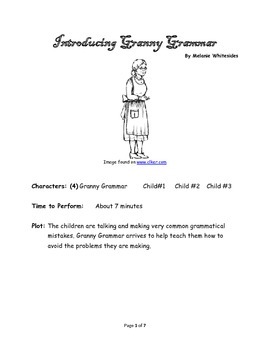Introducing Granny Grammar - Small Group Reader's Theater
- PDF
Description
This small group reader's theater was written for four students. It is based on simple mistakes students make in grammar. If you get irritated when students say can I instead of may I, this reader's theater is for you. It covers the can I/may I issue, when to say a or an, and also the fact that you say went and not goed. It is meant to be fun but also bring home the grammar rules. My ESL groups loved it.
I use reader's theaters to encourage my students to practice fluency. It is a fun way to do something that they need. Most of my scripts are in black and white so they photo copy easily. This one does have a colored picture on the first page but the rest is black and white. The problem with many other reader's theaters is that students spend a lot of time waiting for their part. When you have a small group they get more practice in and less off task behaviors take place.
My name is Melanie Whitesides but I my store name is Wonbyone and I hope that your students enjoy this script as much as mine did. Let me know how things go!
Introducing Granny Grammar by Melanie Whitesides is licensed under a Creative Commons Attribution-NoDerivatives 4.0 International License.




